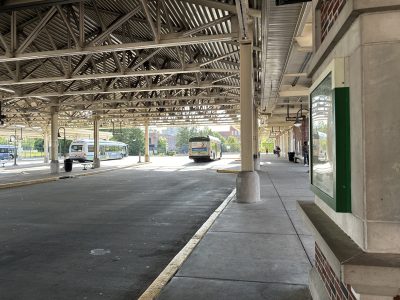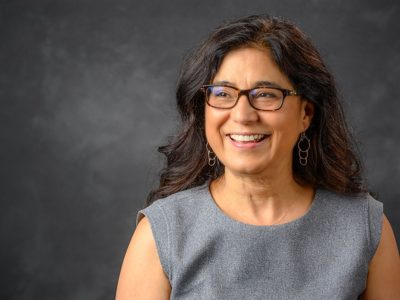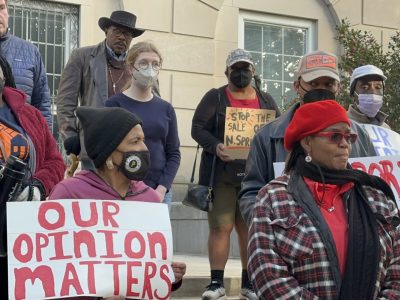by Jordan Green
A former school superintendent with good name recognition takes on a GOP favorite in a Forsyth County Commission race.
In Forsyth County politics, there are two types of Republicans. Declare yourself anything but the conservative kind at your own peril. The conservative Republicans currently hold a 4-3 majority over a coalition comprised of two urban Democrats and moderate Republican Dave Plyler.
Donald L. Martin switched parties from Democrat to the Republican in the early 1990s, he said, because he has a generally conservative philosophy. But before his switch, he sometimes voted Republican, and later sometimes Democratic. He doesn’t shy away from the label “moderate” — anathema in some Republican circles.
“I’m very conservative fiscally,” Martin said. “I’m more moderate as a Republican would be viewed compared to the tea party. I feel comfortable with that.”
Martin has one thing going for his bid to unseat Mark Baker, a conservative incumbent appointed by the county Republican Party in December 2012 to fill a vacancy in District B: Martin served as superintendent of Winston-Salem/Forsyth County Schools for almost two decades until his retirement last year. Having long harbored the goal of running for political office, Martin said he felt he had a small window of opportunity to move.
“I have nothing against [Baker]; he happens to be in the district where I live,” Martin said. “I have name recognition. People know who I am, whether they have a positive view of me or not. That has a short half-life; it dissipates quickly. Timing is important. I’ve got to take advantage of the advantage I’ve got.”
Meanwhile, Baker has some important conservative endorsements locked up. He said he is backed by Debra Conrad, whom he succeeded on the county commission and who is now a member of the state House, and Joyce Krawiec, a party activist who was appointed to fill the unexpired term of Pete Brunstetter in the state Senate. Other local conservative players in Baker’s corner include school board members Jeannie Metcalf and Irene May.
As a first-time candidate, Martin acknowledged he has a learning curve, particularly when it comes to raising money and building a campaign organization. He spoke of his admiration for Dale Folwell, a longtime state lawmaker who now oversees the state of North Carolina’s unemployment insurance system. Martin first got to know him when Folwell served on the board of education, and later endorsed him in his unsuccessful bid for lieutenant governor in 2012. But Martin indicated in an interview that it hadn’t occurred to him to seek reciprocation in his own electoral quest.
Baker ran for county commission twice unsuccessfully before receiving the appointment to fill Conrad’s unexpired term. He also served two terms on the Tobaccoville Village Council. In other respects, the two candidates hold some similarities.
Both live in Tobaccoville, a village on the northern outskirts of Winston-Salem. And both are educators. Martin accepted an appointment as a professor in High Point University’s doctoral program in education leadership. Baker is the high school principal at Salem Baptist Christian School in Winston-Salem.
Martin complimented his opponent’s responsiveness to constituents.
“One of the things that I’m most proud of is our citizen feedback initiative,” Baker said. “Very quickly after I got sworn in I started investigating and found out the county didn’t have a way for citizens to give feedback on the services they received. I spent several months working on that…. My philosophy has been that government should be limited, but what it does it should do well.”
Baker touts his stewardship of the county budget as a member of the governing majority on the county commission.
“This past year we were faced with an $18 million shortfall because of property revaluations,” he said. “We were able to cut taxes for 70 percent of residents while keeping school funding the same as it was before and not cutting education.”
In an interview in a lounge on the first floor of the School of Education, Martin suggested a willingness to chart an independent course on education funding by supporting a bond for technology upgrades in public schools. In contrast, a 2010 bond to build a new library advanced to voters against the wishes of three conservative Republicans on the current commission, while a Democrat who supported the bond lost his reelection bid in the same year. If Martin is elected, his vote could tip the balance back in favor of more funding for education and other county assets that promote quality of life.
Specifically, the candidate said only about 20 out of 80 schools in the district are equipped with adequate classroom technology. The technology in question includes handheld devices distributed among students that allow teachers to gauge whether they understand instructional material. Teachers also use tablets to write equations that show up on a wide screen at the head of the class; or they might let students work through problems on the devices for the benefit of their peers.
“The answer may not include raising taxes,” Martin said. “We could look at a bond issue. Counties have been pretty restrictive about when those can be held. I feel like the public can make decisions on those kind of items.”
The candidates also hold different positions on economic incentives. Baker opposes incentives to private corporations, but last year supported a measure to build a parking deck for the non-profit Wake Forest Innovation Quarter. He said that beyond the fact that the beneficiary was a nonprofit, the fact that, should the research park go under, the parking deck will remain a public asset helped sway his decision.
It might be considered an irony that Conrad, while conservative in other respects, generally supported incentives during her service on the county commission.
“Unfortunately, they’re part of the economic-development landscape,” Martin said. “They should not just be for outside employers. Inmar received incentives to stay in Winston-Salem, and now they’re downtown. I’m very much in favor of that.”
Join the First Amendment Society, a membership that goes directly to funding TCB‘s newsroom.
We believe that reporting can save the world.
The TCB First Amendment Society recognizes the vital role of a free, unfettered press with a bundling of local experiences designed to build community, and unique engagements with our newsroom that will help you understand, and shape, local journalism’s critical role in uplifting the people in our cities.
All revenue goes directly into the newsroom as reporters’ salaries and freelance commissions.





Leave a Reply